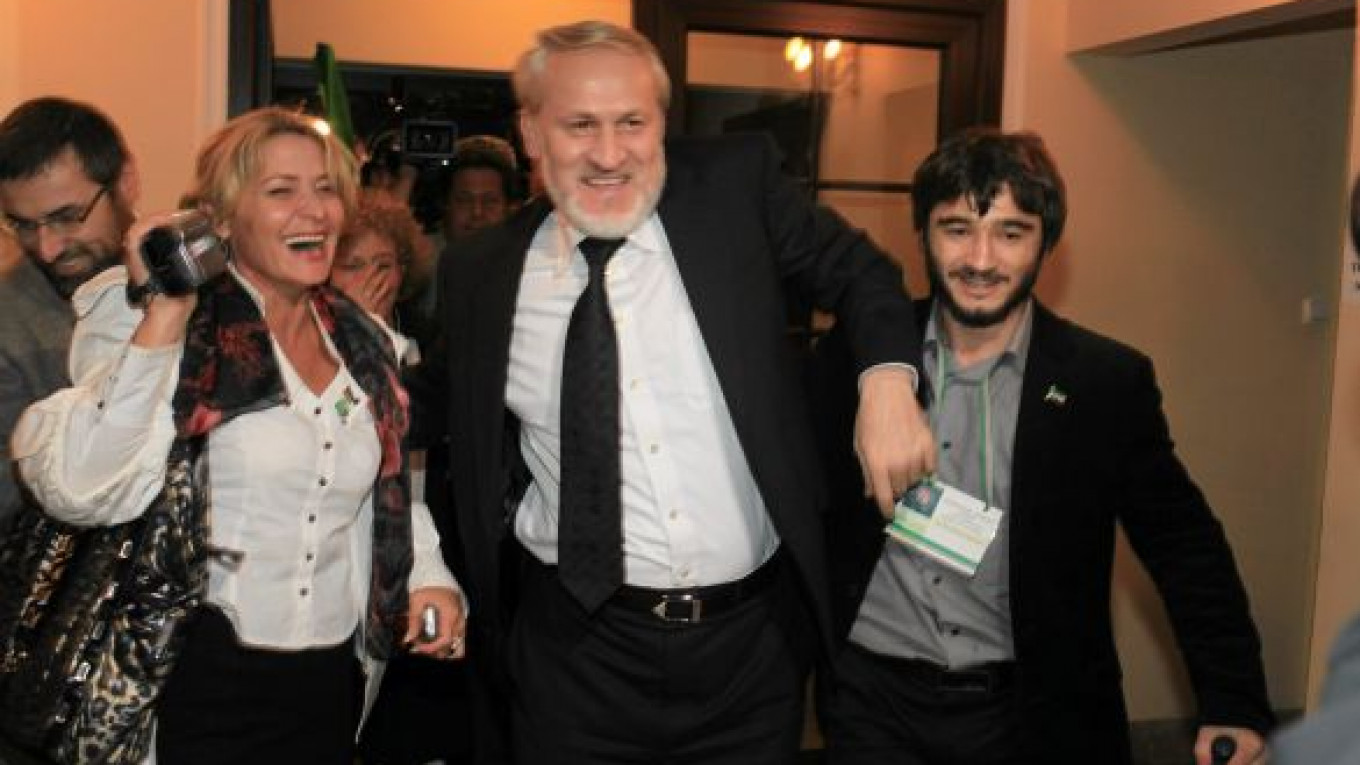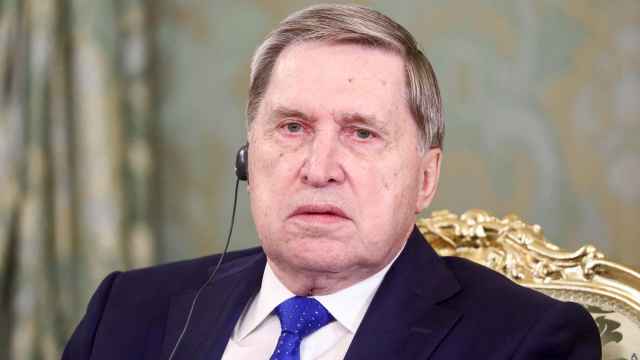WARSAW — Former Chechen rebel envoy Akhmed Zakayev was briefly detained in Poland on Russian charges of murder, kidnapping and terrorism linked to Chechnya's separatist war of the 1990s.
Zakayev, who was granted asylum in Britain years ago, maintains that the accusations are trumped up and defiantly told Radio Free Europe the day before his arrest that he was in Poland "absolutely legally" and would not hide from authorities. The Kremlin casts the dapper activist as a dangerous guerrilla mastermind.
The 51-year-old was apprehended Friday "without any trouble" as he left a home in Warsaw early in the day and was turned over to prosecutors, national police spokesman Mariusz Sokolowski said.
On Friday evening, a Warsaw regional court released Zakayev, who was in Warsaw to attend an international conference on Chechnya. Prosecutors had sought to extend his detention.
Conference organizer Adam Borowski said the court decision meant that Zakayev would stay in Poland pending a court decision on whether he can be extradited.
But court spokesman Wojciech Malek said the ruling meant that Zakayev was free to leave Poland if he wanted. Prosecutors can appeal the decision within seven days.
It was unclear when any decision on a possible extradition might be made. Prosecutors' spokeswoman Monika Lewandowska said prosecutors have not yet received a formal extradition request from Russia.
Zakayev stayed in Warsaw for the conference's final day Saturday but did not talk about his plans beyond that. He said outside the court that he had been confident that "Poland would not abandon the principle of democracy and of the rule of law."
Russia's Foreign Ministry made no comment after the ruling. Shortly after the arrest, ministry spokesman Andrei Nesterenko told a news briefing: "We are following the evolution of this subject. As soon as we learn more, we will inform you. We are monitoring this situation and are in contact with the Polish authorities."
Supporters said Zakayev had been on his way to turn himself in for questioning when he was picked up by the police.
Zakayev — who with his silver beard and impeccable tailoring looks more the diplomat or professor than guerrilla fighter — appeared relaxed in a crisp white shirt and suit as he arrived in a police car at the prosecutor's office.
"I am not expecting anything that would violate the rules of the law," he told television cameras upon his arrival. "Poland is a democratic, law-abiding nation. When I learned that there will be no problems, I decided to come."
Zakayev said Saturday that the court's decision to release him "showed once again that the position of people in Europe concerning Russia's approach to Zakayev has not changed, that they stand by the law."
Zakayev said his arrest was a "misunderstanding" on the part of Russian authorities, which might have thought that they could influence a decision in Poland.
Although the police earlier had warned that they would detain Zakayev if he visited Warsaw, the arrest came as a surprise to many in Poland — which has prided itself on supporting the spread of independence and democracy by offering support to activists abroad, including from Chechnya, ever since it broke free of Moscow's influence in 1989 and triggered similar upheavals across Eastern Europe.
The detention came at a time when relations between Moscow and Warsaw are beginning to thaw. President Dmitry Medvedev is scheduled to visit Poland later this year as a sign of a "new start" in bilateral relations that offer a huge potential in all fields, the Russian ambassador has said.
If Zakayev is not turned over to Moscow, the diplomatic bridge-building could run into trouble. In 2002, both Denmark and Britain experienced a cooling of ties with Russia after they rejected similar requests to extradite Zakayev.
Prime Minister Donald Tusk said before the arrest that police would be legally bound to pick Zakayev up if he showed up for the World Chechen Congress because there was an international warrant for his arrest distributed by Interpol.
Later, however, he indicated that Poland was not prepared to send Zakayev to Russia just to keep Moscow happy. Zakayev will be treated "in accordance with our understanding of Poland's interests and with our sense of decency and justice, and we will not be trying to meet anybody's expectations," Tusk said.
Chechen President Ramzan Kadyrov brushed aside Zakayev's comments, saying "he is a good actor and behaving like one," and called for his prompt return to Russia.
"By law, he needs to be given a life sentence," Kadyrov said. "This is what I think. Killing him or something else would be a pleasure to him. He needs to be jailed for life, so that he sees what he did."
Russian Ambassador to Poland Alexander Alexeyev said earlier in the week that Russia "has proof" Zakayev had been involved in terrorism. But it appeared from Russian officials' statements that the charges sent to Poland were similar to those used in previous — unsuccessful — extradition requests.
A Message from The Moscow Times:
Dear readers,
We are facing unprecedented challenges. Russia's Prosecutor General's Office has designated The Moscow Times as an "undesirable" organization, criminalizing our work and putting our staff at risk of prosecution. This follows our earlier unjust labeling as a "foreign agent."
These actions are direct attempts to silence independent journalism in Russia. The authorities claim our work "discredits the decisions of the Russian leadership." We see things differently: we strive to provide accurate, unbiased reporting on Russia.
We, the journalists of The Moscow Times, refuse to be silenced. But to continue our work, we need your help.
Your support, no matter how small, makes a world of difference. If you can, please support us monthly starting from just $2. It's quick to set up, and every contribution makes a significant impact.
By supporting The Moscow Times, you're defending open, independent journalism in the face of repression. Thank you for standing with us.
Remind me later.






